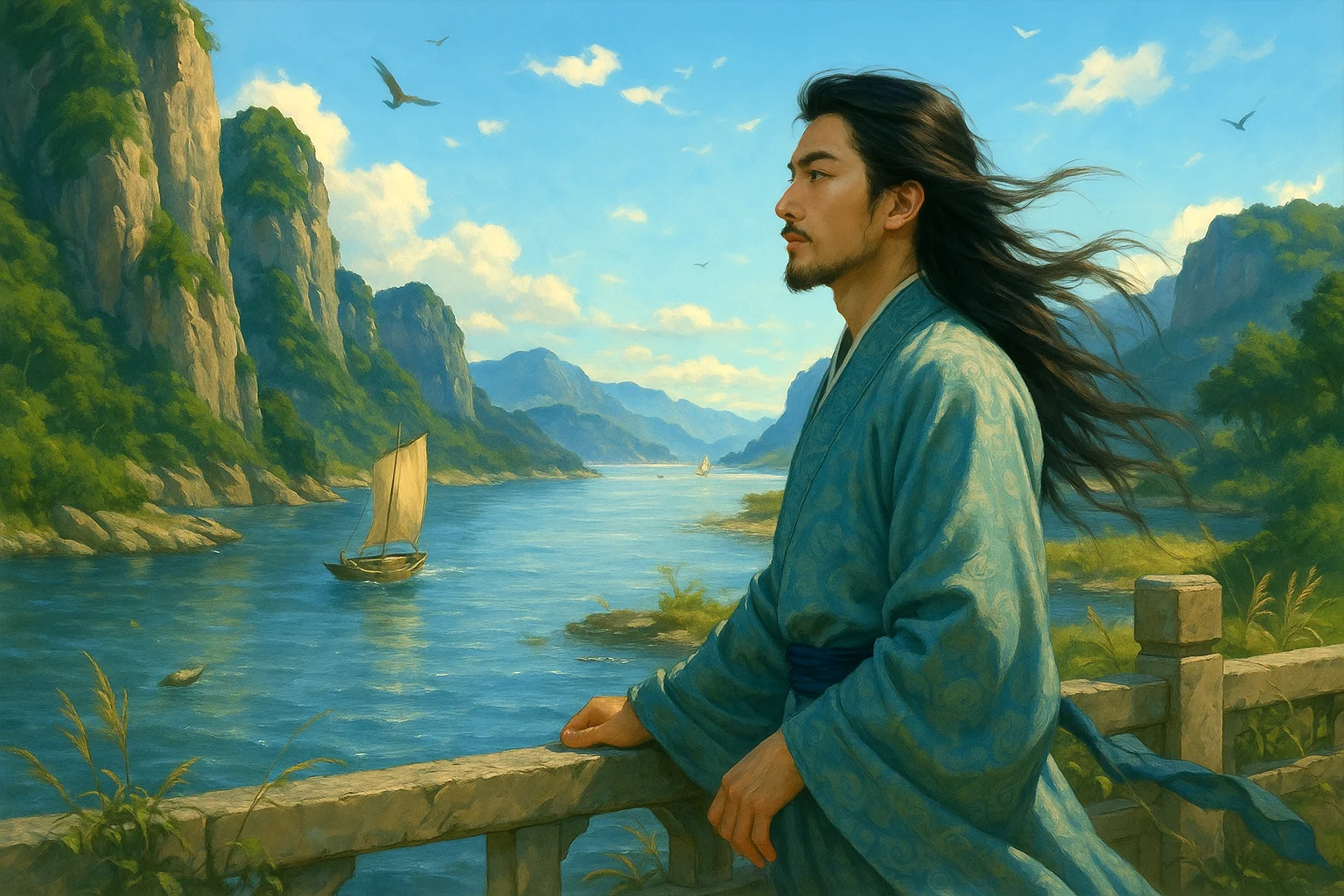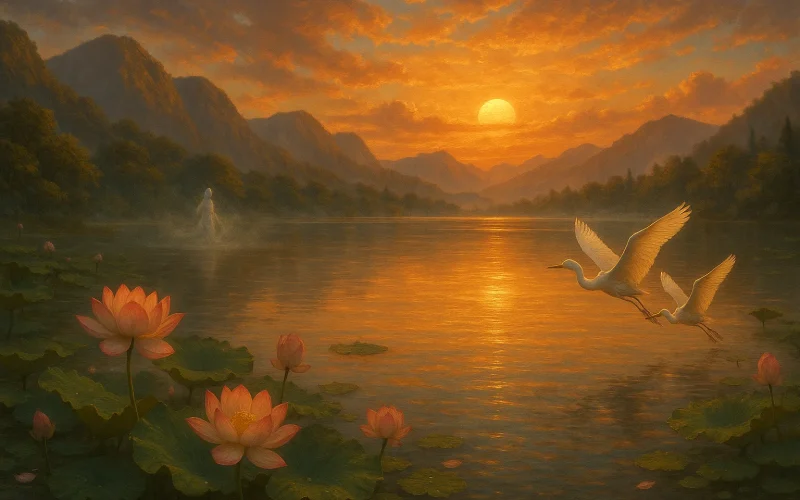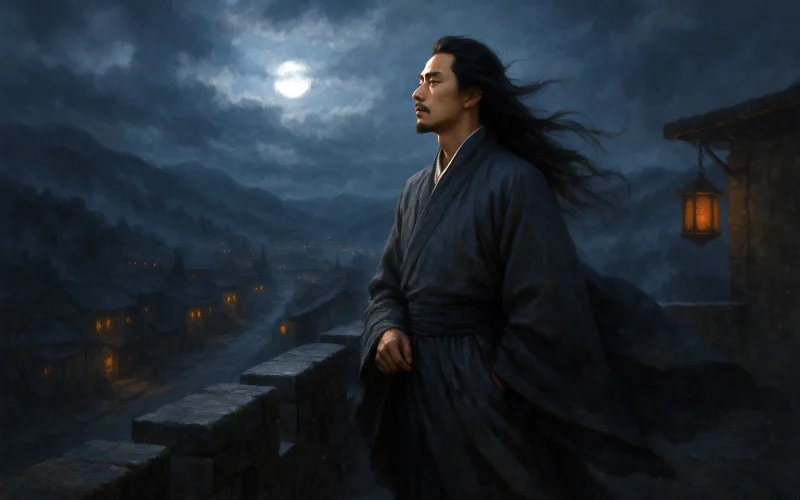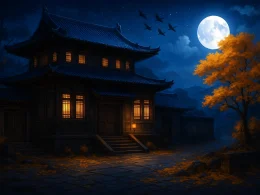Rain clears on Phoenix Mountain’s crest,
Lake breeze fresh, sunset dressed.
A single lotus, bloomed yet still fair,
Lingers with grace beyond compare.
Whence come these twin egrets in flight?
As if enchanted by her sight.
Suddenly, grief-laden zither’s cry—
Who bears this tune? Who hears this sigh?
Mists part, clouds hush—the Xiang River’s sprite?
I wait till the last note takes flight,
But find no soul in view,
Only blue peaks piercing through.
Original Poem
「江城子 · 湖上与张先同赋」
凤凰山上雨初晴。水风清,晚霞明。
一朵芙蓉,开过尚盈盈。
何处飞来双白鹭,如有意,慕娉婷。忽闻江上弄哀筝。
苏轼
苦含情,遣谁听?烟敛云收,依约是湘灵。
欲待曲终寻问取,人不见,数峰青。
Interpretation
Composed during Su Shi's middle years on a boating excursion near Phoenix Mountain, this cí crystallizes a moment where landscape, music, and mythology converge. The work's genius lies in its gradual dematerialization—from tangible scenery to ethereal sound to pure absence—embodying the Daoist ideal of "trace beyond traces" (象外之象). Written in response to Zhang Xian's original poem, it transforms a chance encounter with zither music into a meditation on artistic epiphany's fleeting nature.
Upper Stanza: "凤凰山上雨初晴。水风清,晚霞明。一朵芙蓉,开过尚盈盈。何处飞来双白鹭,如有意,慕娉婷。"
Fènghuáng shān shàng yǔ chū qíng. Shuǐ fēng qīng, wǎnxiá míng. Yī duǒ fúróng, kāi guò shàng yíngyíng. Hé chù fēilái shuāng báilù, rú yǒu yì, mù pīngtíng.
Phoenix Mountain sheds its rain;
Lake breeze crisp,
Sunset aflame.
A single lotus, past full bloom,
Still holds its glow.
Whence come these paired egrets—
As if drawn
To such grace?
The scene composes itself like a Song dynasty album leaf: the "crisp" breeze (清) and "aflame" sunset (明) engage multiple senses, while the "paired egrets" (双白鹭) introduce narrative tension. The lotus—past prime yet radiant ("still holds its glow")—becomes an objective correlative for the unseen musician's enduring artistry.
Lower Stanza: "忽闻江上弄哀筝。苦含情,遣谁听?烟敛云收,依约是湘灵。欲待曲终寻问取,人不见,数峰青。"
Hū wén jiāng shàng nòng āi zhēng. Kǔ hán qíng, qiǎn shéi tīng? Yān liǎn yún shōu, yīyuē shì Xiānglíng. Yù dài qǔ zhōng xún wèn qǔ, rén bújiàn, shù fēng qīng.
Then—zither strains from midriver:
Bitter longing,
But for whose ears?
Mist gathers, clouds part—
Could this be Xiang River's nymph?
I wait for the last note to seek her…
Only green peaks
Keep vigil.
Here, music triggers ontological shift: "bitter longing" (苦含情) permeates the soundscape before the player is mythologized as Xiangling (湘灵), the legendary zither virtuoso drowned in the Xiang River. The vanishing act ("only green peaks") echoes the Zhuangzian paradox—true art's consummation lies in its disappearance. The "green peaks" (青) at the end mirror the "crisp breeze" (清) at the start, creating cyclical harmony.
Holistic Appreciation
This exquisitely crafted lyric poem weaves together human presence, natural scenery, and musical resonance through the central motif of "zither-playing." The opening lines set the stage with a freshly rain-washed landscape—Phoenix Mountain, twilight clouds, lake breezes, and lotus blossoms—creating an ethereal backdrop that gradually introduces the zither player.
The woman is likened to a lotus emerging from water, her grace so captivating that even egrets pause to gaze, emphasizing her physical beauty and ethereal charm. The second stanza deepens the emotional current, shifting from visual beauty to auditory melancholy. The "plaintive zither" reveals hidden sorrows, while imagery of "mist dissolving, clouds parting" and the allusion to the Xiang River goddess elevates the scene to a transcendent, spiritual realm.
The closing lines—"the music ends, no figure in sight / only emerald peaks remain"—masterfully adapt a Tang poetic trope. Without directly describing the woman’s departure, the poem leaves her presence lingering in the quiet majesty of nature, evoking infinite resonance.
Beyond its technical brilliance in portraying character and atmosphere, this work is a meditation on beauty, sorrow, and the ephemeral—a fleeting moment where aesthetic perfection and human fragility intertwine.
Artistic Merits
- Seamless Fusion of Scene and Emotion
The poem moves fluidly from landscape (lotus, egrets) to music (zither’s lament), each element deepening the emotional texture. The transition from sensory delight to introspective melancholy feels organic, almost inevitable. - Symbolic Layering: Human and Mythic
The zither player is both a real woman and a symbolic figure—her sorrow echoed in nature’s responses (mist, clouds) and mythic parallels (Xiang goddess). This duality bridges the tangible and the divine. - Allusive Depth
The reference to Xiang River goddess (湘灵) invokes a tradition of exiled beauty and unfulfilled longing, enriching the poem’s emotional subtext. The closing nod to Tang poet Qian Qi’s "曲终人不见,江上数峰青" further layers cultural memory. - Resonant Silence
The ending’s deliberate omission—the woman vanishes, leaving only peaks—epitomizes lyricism through absence. What’s unsaid lingers louder than explicit description, inviting readers to project their own longing onto the landscape.
Insights
This poem distills a universal truth: true beauty is inseparable from melancholy. The zither player’s allure lies not just in her grace, but in the fleeting, unattainable quality of the moment—a harmony of sound, sight, and emotion that transcends time yet cannot be held.
Su Shi’s genius here is his ability to elevate the personal into the cosmic. A stranger’s zither melody becomes a conduit for shared human fragility, framed by nature’s immutable quietude. The work whispers: art’s highest purpose is not to dazzle, but to awaken in us a recognition of life’s poignant transience.
About the Poet

Su Shi (苏轼, 1037 - 1101), a native of Meishan in Sichuan, was a polymath of the Northern Song literary world. His prose was expansive and unrestrained, his poetry fresh and vigorous, and his ci poetry pioneered the bold and unconstrained style. In calligraphy, he created the "Su Style," and in painting, he championed "spiritual resonance," earning him a place among the "Four Masters of the Song." Despite repeated political persecutions—most notably the "Poetry Case of the Black Terrace"—his exile to Huangzhou, Huizhou, and Danzhou yielded timeless masterpieces. Lu You praised him as "the literary patriarch of an era."












